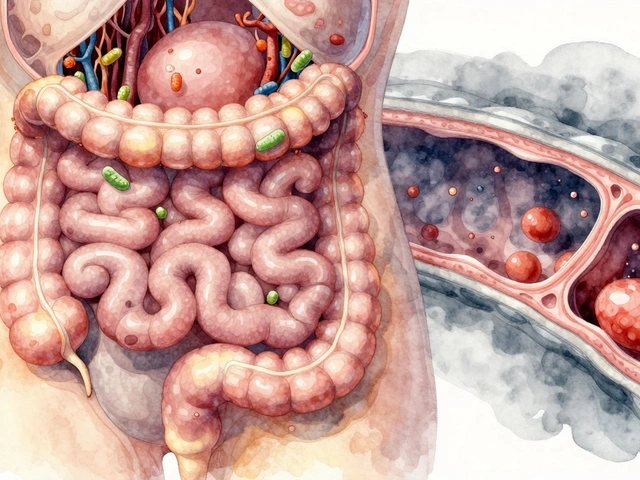When it comes to gastrointestinal health, there is no shortage of myths and misconceptions. Many of us have heard conflicting advice about what we should and shouldn’t be eating, how stress impacts our gut, and the types of habits that promote a healthy digestive system.
In this article, we'll shed light on the truth behind some of these widespread myths. By understanding the real factors that influence our gastro health, we'll be better equipped to make informed decisions about our diet and lifestyle. Whether you're looking to improve your digestion or simply maintain it, the following insights and tips will guide you on the right path.
- Common Myths About Gastro Health
- The Role of Diet in Digestive Health
- Understanding Stress and Gut Connection
- Lifestyle Changes for a Healthy Gut
- Expert Tips for Maintaining Gastro Health
Common Myths About Gastro Health
When it comes to gastrointestinal health, myths and misconceptions are abundant. Many people believe certain foods or habits have miraculous effects on digestion, but the reality is often more complex. One of the most prevalent myths is that spicy foods cause ulcers. This belief is widespread and can make people avoid spicy dishes unnecessarily. In truth, most stomach ulcers are caused by the bacterium Helicobacter pylori or by the chronic use of nonsteroidal anti-inflammatory drugs (NSAIDs). Spicy food might irritate an already sensitive stomach, but it isn’t a direct cause of ulcers.
Another common myth is that fiber is always good for digestion. While it's true that dietary fiber is essential for a healthy digestive system, not all types of fiber are beneficial for everyone. For instance, individuals with irritable bowel syndrome (IBS) might find that insoluble fiber exacerbates their symptoms. It's crucial to understand your body's specific needs and adjust your diet accordingly.
Many people also believe that dairy automatically leads to digestive issues. While lactose intolerance does affect a significant portion of the population, not everyone needs to avoid dairy. Some can tolerate lactose-free products or aged cheeses that contain less lactose. Blanket statements about dairy can be misleading, and it’s important to identify what works for you.
There’s also a common misconception that drinking water during meals dilutes stomach acid and impairs digestion. This is not supported by scientific evidence. In fact, water can aid the digestive process by helping break down food more effectively. It also assists in the absorption of nutrients. Moderation is key; drinking excessive amounts of water may cause temporary discomfort, but a few sips during a meal are typically beneficial.
Many believe that all probiotics are created equal and can solve any gut issue. While probiotics can be helpful, they are not a one-size-fits-all solution. Different strains of probiotics serve different purposes, and it’s important to choose the right type for your specific condition. Consulting with a healthcare provider can provide clarity on which probiotic may be beneficial for you.
Another persistent myth is that chewing gum can stay in your stomach for seven years. This is an old wives' tale with no scientific backing. While chewing gum is not easily digestible, it will eventually pass through your digestive system and be excreted. The human body is quite efficient at handling indigestible substances.
Lastly, many people believe that detox diets and cleanses are essential for maintaining a healthy gut. However, the body already has natural detoxifying systems in place, primarily the liver and kidneys. There’s little scientific evidence supporting the need for such extreme measures. Balanced nutrition and regular exercise are far more effective for maintaining digestive health.
The Role of Diet in Digestive Health
When we talk about digestive health, diet always plays a significant role. The types of food we consume can either support or hinder our digestive system. One key fact to understand is that the human gut houses trillions of bacteria, collectively known as the gut microbiome. This microbiome plays a crucial role in breaking down food, absorbing nutrients, and supporting immune functions.
For good digestion, incorporating a balanced diet rich in fiber is essential. Foods like fruits, vegetables, whole grains, and legumes provide the necessary fiber that promotes regular bowel movements and prevents constipation. Fiber also feeds the beneficial bacteria in our gut, which in turn produce short-chain fatty acids that strengthen the lining of the gut.
Water is another critical component that aids digestion. Staying hydrated helps dissolve fats and soluble fiber, allowing these substances to pass through the intestines more easily. Not drinking enough water can lead to dehydration, which can cause hard stools and constipation.
On the flip side, too much consumption of processed foods, high sugar, and fatty foods can disrupt the balance of bacteria in the gut. Junk food lacks the necessary nutrients and fiber, contributing to digestive issues. It is better to opt for healthier snacks like fruits, nuts, and yogurt that support gut health.
Fermented foods like yogurt, kefir, sauerkraut, and kimchi are excellent for maintaining a healthy gut. These foods contain probiotics, which are live bacteria that can help boost the population of beneficial bacteria in the gut. This is crucial because a healthy balance of gut bacteria can protect against pathogens, support the immune system, and even influence mood and mental health.
“Dietary choices are a powerful message to your gut microbiome. Your gut health is a mirror of how you eat,” says Dr. Sarah Ballantyne, a health expert.
It’s also important to note that food intolerances and allergies can affect digestive health. For example, lactose intolerance, where the body cannot digest lactose found in dairy products, can lead to symptoms like bloating, gas, and diarrhea. Being mindful of how your body reacts to certain foods and avoiding triggers can significantly improve digestive comfort.
In summary, maintaining a healthy digestive system largely depends on eating a balanced diet full of fibers, probiotics, and staying hydrated. Avoiding high-sugar and high-fat processed foods will benefit your gut microbiome and overall health. Understanding the relationship between diet and digestion empowers you to make better dietary choices for long-term well-being.

Understanding Stress and Gut Connection
Many people might be surprised to learn just how deeply our mental state can affect our digestive health. Have you ever had a 'gut-wrenching' experience or 'butterflies in your stomach' when you're nervous? These expressions actually point to a real connection between your brain and your gut. This relationship is known as the gut-brain axis.
Stress can take a real toll on your digestive system. When you're stressed, your body switches into 'fight or flight' mode, causing it to prioritize immediate survival over other functions. This can lead to a range of digestive issues like stomach pain, diarrhea, constipation, and even irritable bowel syndrome (IBS). Chronic stress can alter the balance of bacteria in your gut, known as the microbiome, which is crucial for proper digestion and absorption of nutrients.
A study by the American Psychological Association found that stress levels in the U.S. have been rising steadily. It's no wonder that digestive issues are on the rise too. The body's response to stress is natural, but when stress becomes chronic, it can disrupt the intricate balance of the digestive system. Not many realize that the gut produces around 90% of the body's serotonin, a key hormone that stabilizes mood, feelings of well-being, and happiness. So, a stressed gut can often mean a stressed mind.
"The brain and the gut are intimately linked, and stress affects this relationship. Proper management of stress is crucial for maintaining a healthy digestive system," says Dr. Emeran Mayer, a renowned gastroenterologist and author.
There are specific strategies to manage stress and thus improve gut health. One effective method is mindfulness meditation. Studies show that people who practice mindfulness experience less stress and fewer digestive problems. Another approach is regular physical activity, which helps lower stress hormones and reduce inflammation in the gut. A healthy diet also has a big role in stress management. Consuming foods rich in omega-3 fatty acids, such as fish, flaxseeds, and walnuts, can help manage stress and offer anti-inflammatory benefits.
It's important to maintain social connections and engage in activities that bring joy and relaxation. Simple acts like spending time with loved ones, laughing, or pursuing hobbies can significantly reduce stress levels. Gut health isn't just about what you eat but how you feel and manage your emotions on a day-to-day basis. Thus, embracing a holistic approach that considers both diet and mental well-being can have lasting positive effects on your digestive health.
Lifestyle Changes for a Healthy Gut
Many people don't realize just how much their daily habits can impact their digestion. The truth is, simple lifestyle changes can have a profound effect on your gastrointestinal health. From the foods you eat to how you manage stress, these factors contribute to a healthy gut.
First, let's talk about diet. A diet rich in fiber, such as fruits, vegetables, whole grains, and legumes, can improve gut health by promoting regular bowel movements and preventing constipation. But it's not just about eating enough fiber; the type of fiber also matters. Soluble fiber, found in foods like oats and apples, helps absorb water and form a gel-like substance in the gut, which can slow digestion and make you feel fuller, longer. Meanwhile, insoluble fiber adds bulk to the stool and aids in its passage through the digestive tract. Eating a balanced mix of both is key to maintaining a healthy digestive system.
Another important factor is hydration. Drinking plenty of water is essential as it helps break down food, absorb nutrients, and soften stool. Lack of hydration can lead to hard, dry stools that are difficult to pass, causing strain and potential gastrointestinal discomfort. Aim to drink at least eight 8-ounce glasses of water a day, more if you're physically active or live in a hot climate.
It's also crucial to be mindful of your eating habits. Eating large meals in a hurry or late at night can overwhelm your digestive system. Instead, opt for smaller, frequent meals and eat slowly to give your body time to properly digest the food. Research has shown that mindful eating can significantly reduce symptoms of indigestion and bloating. Chewing your food thoroughly also helps, as digestion begins in the mouth with the enzyme amylase breaking down carbohydrates.
Stress management is another key component. Stress can wreak havoc on your digestive system, exacerbating issues like IBS (Irritable Bowel Syndrome) and heartburn. Incorporating stress-relief practices such as yoga, meditation, or even simple breathing exercises can go a long way in maintaining a healthy gut.
“Stress impacts the gut by altering its motility, permeability, and sensitivity,” says Dr. Michael Gershon, a pioneer in neurogastroenterology.Regular exercise can also help manage stress levels and has been shown to improve gut motility. Aim for at least 30 minutes of moderate exercise, like brisk walking, on most days.
Lastly, limiting your intake of junk food, alcohol, and caffeine can make a significant difference. These items are known to irritate the gut lining and disrupt the delicate balance of gut flora. Instead, focus on incorporating probiotic-rich foods like yogurt, kefir, and sauerkraut into your diet. Probiotics help maintain a healthy balance of bacteria in your gut, which is crucial for good digestion.
Making these lifestyle changes may seem daunting at first, but their impact on your gastro health can be profound. By taking small, consistent steps towards better habits, you'll pave the way for a healthier and happier digestive system.

Expert Tips for Maintaining Gastro Health
When it comes to maintaining gastro health, it’s important to listen to the experts. A well-functioning digestive system is central to overall health, and there are several practical steps you can take to keep it in good shape.
First, make sure you’re eating a balanced diet rich in fiber. Fiber plays a crucial role in digestion, helping to move food through your digestive tract and preventing constipation. Incorporate a variety of fruits, vegetables, whole grains, and legumes into your meals. Experts recommend that women should aim for 21–25 grams of fiber per day, while men should aim for 30–38 grams.
Staying hydrated is another key to good digestion. Water helps break down food so that your body can absorb nutrients more efficiently. Aim to drink at least eight 8-ounce glasses of water a day, and more if you’re physically active or live in a hot climate. Herbal teas can also be beneficial, particularly those that contain ginger or peppermint, which may help soothe the digestive tract.
“Proper hydration is essential for digestive health. Without adequate water intake, the process of digestion can slow down, leading to discomfort and potential health issues,” says Dr. Jane Smith, a leading gastroenterologist.
Another essential tip is to stay active. Regular physical activity helps stimulate the muscles in your GI tract, which helps prevent constipation. Aim for at least 30 minutes of moderate activity, like walking or cycling, most days of the week. Exercise also helps reduce stress, which has been shown to negatively impact digestive health.
Speaking of stress, finding ways to manage it is crucial. Chronic stress can lead to digestive problems such as irritable bowel syndrome (IBS) and exacerbated symptoms of indigestion. Techniques like meditation, yoga, and deep-breathing exercises can help reduce stress and promote a healthier gut. Even simple activities like gardening, reading, or spending time with loved ones can help alleviate stress.
It’s also vital to get enough sleep. Poor sleep is linked to a host of digestive issues, including increased acid reflux and impaired gut motility. Aim for 7–9 hours of quality sleep per night. Establishing a regular sleep routine and creating a calming bedtime environment can make a big difference in the quality of your sleep.
Feel free to supplement your diet with probiotics, which are beneficial bacteria that support a healthy gut flora. Probiotics are found in foods like yogurt, kefir, sauerkraut, and other fermented products. They can also be taken as supplements, but it’s a good idea to consult with a healthcare provider beforehand to find the right type and dosage for you.
Avoiding bad habits can be just as important as fostering good ones. Smoking, excessive alcohol consumption, and a diet high in processed foods can wreak havoc on your digestive system. Cutting back on these can lead to significant improvements in gastro health. In particular, refined sugars and unhealthy fats can disturb the balance of gut bacteria, so it's best to limit these whenever possible.
Finally, don't hesitate to consult with a healthcare professional if you encounter persistent digestive problems. Conditions like IBS, Crohn’s disease, and gastroesophageal reflux disease (GERD) require medical attention for proper management. Early intervention can prevent the worsening of symptoms and improve quality of life.
By taking these expert-recommended steps, you can help ensure your digestive system operates smoothly and effectively. A healthy gut contributes significantly to your overall wellbeing, so it’s worth putting in the effort to keep it in prime condition.






